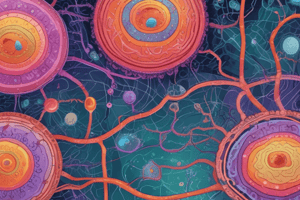Podcast
Questions and Answers
What percentage of the total marks in the MDCAT exam is accounted for by Biology?
What percentage of the total marks in the MDCAT exam is accounted for by Biology?
- 20%
- 30%
- 50%
- 40% (correct)
Which of the following topics is NOT covered in MDCAT Biology?
Which of the following topics is NOT covered in MDCAT Biology?
- Ecology
- Mathematics (correct)
- Microbiology
- Genetics
What is the process by which cells make their own food?
What is the process by which cells make their own food?
- Mitosis
- Respiration
- Photosynthesis (correct)
- Meiosis
What is the study of the structure, function, and behavior of microorganisms?
What is the study of the structure, function, and behavior of microorganisms?
What is the term for the process by which an organism's internal environment is maintained within a narrow range?
What is the term for the process by which an organism's internal environment is maintained within a narrow range?
What is the term for the building blocks of proteins?
What is the term for the building blocks of proteins?
Flashcards
Importance of Biology in MDCAT
Importance of Biology in MDCAT
Biology accounts for 40% of the MDCAT exam, forming the basis of medical sciences.
Cell Biology (MDCAT)
Cell Biology (MDCAT)
MDCAT Cell Biology covers cell structures, cell membrane functions (transport), cell division (mitosis & meiosis).
Genetics (MDCAT)
Genetics (MDCAT)
MDCAT Genetics includes learning Mendel's laws, DNA structure, replication, and gene expression/mutation.
Evolution (MDCAT)
Evolution (MDCAT)
Signup and view all the flashcards
Human Physiology (MDCAT)
Human Physiology (MDCAT)
Signup and view all the flashcards
Photosynthesis and Respiration (MDCAT)
Photosynthesis and Respiration (MDCAT)
Signup and view all the flashcards
Study Notes
MDCAT Biology
Importance of Biology in MDCAT
- Biology accounts for 40% of the total marks in the MDCAT exam
- It is a crucial subject for medical students as it forms the basis of medical sciences
Topics Covered in MDCAT Biology
- Cell Biology
- Cell structure and function
- Cell membrane and transport
- Cell division (mitosis and meiosis)
- Genetics
- Mendel's laws of inheritance
- DNA structure and replication
- Gene expression and mutation
- Evolution
- Principles of evolution
- Natural selection and speciation
- Human evolution
- Biodiversity
- Classification of living organisms
- Plant and animal kingdoms
- Ecosystems and ecology
- Human Physiology
- Human body systems (skeletal, muscular, nervous, etc.)
- Functions and disorders of human body systems
- Microbiology
- Introduction to microbiology
- Types of microorganisms (bacteria, viruses, fungi)
- Microbial interactions and diseases
Key Concepts and Terms
- Photosynthesis and respiration
- Ecology and ecosystem services
- Homeostasis and feedback mechanisms
- Biological molecules (carbohydrates, proteins, lipids)
- Human health and disease
Tips for Preparing MDCAT Biology
- Focus on understanding key concepts and principles
- Practice problem-solving and critical thinking
- Review and reinforce weak areas regularly
- Use online resources and practice tests to assess knowledge and identify areas for improvement
MDCAT Biology
Importance of Biology in MDCAT
- Biology constitutes 40% of the total marks in the MDCAT exam, making it a crucial subject for medical students.
- It forms the foundation of medical sciences, highlighting its significance in the exam.
Topics Covered in MDCAT Biology
Cell Biology
- Cell structure encompasses cell membrane, cytoplasm, and nucleus.
- Cell function involves metabolic processes, growth, and response to stimuli.
- Cell membrane transport mechanisms include passive and active transport.
- Cell division occurs through mitosis and meiosis, with distinct stages and processes.
Genetics
- Mendel's laws of inheritance describe the principles of genetic inheritance.
- DNA structure is a double helix, with replication occurring through semiconservative replication.
- Gene expression involves transcription and translation, with mutation leading to changes in gene function.
Evolution
- Evolution is based on principles of variation, mutation, and natural selection.
- Natural selection drives speciation, resulting in the diversity of species.
- Human evolution is a key aspect of the study of evolution.
Biodiversity
- Classification of living organisms involves categorization into domains, kingdoms, and taxa.
- Plant and animal kingdoms exhibit distinct characteristics and diversity.
- Ecosystems and ecology encompass the interactions between organisms and their environment.
Human Physiology
- Human body systems include skeletal, muscular, nervous, circulatory, and digestive systems.
- Functions of human body systems include support, movement, control, and regulation.
- Disorders of human body systems, such as muscular dystrophy and Parkinson's disease, are important to understand.
Microbiology
- Microbiology involves the study of microorganisms, including bacteria, viruses, and fungi.
- Microorganisms interact with their environment and can cause diseases.
- Microbial interactions are crucial for human health and the environment.
Key Concepts and Terms
- Photosynthesis and respiration are essential metabolic processes.
- Ecology and ecosystem services involve the interactions between organisms and their environment.
- Homeostasis and feedback mechanisms regulate physiological processes.
- Biological molecules, such as carbohydrates, proteins, and lipids, are essential for life.
- Human health and disease are critical aspects of biology, with an understanding of the causes and mechanisms of disease.
Tips for Preparing MDCAT Biology
- Focus on understanding key concepts and principles rather than memorizing facts.
- Practice problem-solving and critical thinking to develop analytical skills.
- Regularly review and reinforce weak areas to ensure comprehensive understanding.
- Utilize online resources and practice tests to assess knowledge and identify areas for improvement.
Studying That Suits You
Use AI to generate personalized quizzes and flashcards to suit your learning preferences.




